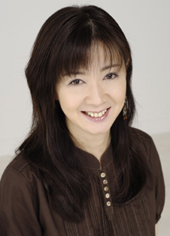Les 24 Chevaliers Part IV: Michiru Oshima (Music Composer)
This series will feature key production staff members of Le Chevalier D'Eon. In each feature, they will talk about their aspirations, how they came to join the staff and some of the insider stories.
Part IV
 Michiru Oshima
Michiru Oshima
Music composer. Born in Nagasaki City, she graduated from the Department of Composition at Kunitachi College of Music. She started her career as a composer/arranger while still studying at college, and successfully pursued a career in composing music for film, commercial, TV, animation, and installation. Her awards include: the Mainichi Film Competition Music Award, the 21st, 24th, 26th, 27th and 29th Japan Academy Awards Best Music Awards and the 2006 Animation of the Year Music Award.
She composed the music for many live-action movies and anime, such as FullMetal Alchemist, The Weathering Continent and Legend of Chrystania.
"For the first time in years, I had a chance to compose pieces that were very classical."
Oshima composed the music, attended the recording sessions and supervised everything to the very last step. She sometimes had to reschedule recording dates to get hold of musicians who were at the same skill level.
She looks back at the recording for Le Chevalier D'Eon: "When we recorded the music, there were some musicians who saw the score for the first time, but they didn't even make a mistake. Most recordings were OK'd on the first try. I could feel their overwhelming focus."
She also told us of her impressions about the first episode of the series.
"As soon as I saw the scenes of the Hall of Mirrors and the Palace Gardens, I could feel like being in Versailles right away. They put in so much effort to make it look real. Many of the animations today are set in imaginary places, but Le Chevalier D'Eon has the power to convince us with real history. It's so different from anime for kids since we adults can commit to it. The drawings are so velvety, the colors are beautiful and so much detail they've put in. I am sure the staff worked very hard on it. I hope they will make it into a film for theatres, too." (lol)
Oshima has done many film scores, and had a lot to reflect on anime music.
"In animation, you can show things that do not exist. You can create an entire new world, from the historical period to the geographical location. It would be difficult to film inside the actual Palace of Versailles, but with animation, you can render it. I can feel the potential of imagination there.
In the live-action films, characters are actual humans; so we can convey emotion with a slight move of the eyes while, for instance, drinking tea. On the other hand, in animation, it is difficult to do that just by showing the character drinking tea, no matter how great the drawings are. That's why the music in animation is not only used to support the drama, but also to over-exaggerate and complement the emotional expressions that are difficult to portray on screen."
Lastly, we asked what she had particularly kept in mind while composing for Le Chevalier D'Eon.
"While I was working on Le Chevalier D'Eon, I was consciously trying to add depth that's typical of European classical music. Also, I used a lot of repeated phrases in the chorus parts and short melody lines. I thought adding human voices to the music increased the appealing and persuasive tones, which subsequently knitted magical and formal images.
Usually, if you have conversation overlapping music, it is difficult to understand the lines, but if you use a strings orchestra, the sound of music and human voice are easier to distinguish from each other, so you have powerful music that doesn't interfere with the dialogue. The characters in Le Chevalier D'Eon are all serious and weighty, so I think the majestic orchestral pieces suit well. For the first time in a long while, I composed pieces that were very classical, so I enjoyed working on it very much. When I am composing, the compatibility with the literature is vital. As for Le Chevalier D'Eon, I felt very invited."
Oshima said, "When I complete my work, I am sometimes too busy to watch the finished program. But in the case of Le Chevalier D'Eon, I look forward to watching the new episodes." She also added that she felt Le Chevalier D'Eon told the story of "the way people lived." In whatever age you live in, there is bitterness and harshness, which is a part of that particular time. "I would like the audience to see how people lived in these circumstances."

![WORK LIST[DETAILS]](/contents/works/design/images/left_title.gif)



 terms of use
terms of use